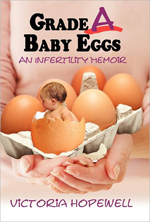As an avid reader, Victoria Hopewell has been a long-time member of book clubs, enjoying the literature and conversation. She invites you to consider Grade A Baby Eggs: An Infertility Memoir for your next book club gathering. With 7.3 million infertile people in the United States, it’s likely that you or someone you know has experienced infertility. Victoria’s first-person memoir is a dynamic read that lends itself to an instant discussion. Her conversational narrative is thoughtful and touchingly humorous, not only focusing on infertility, but the intricate blending of a new family.
Victoria welcomes book clubs from around the country and is happy to visit in person with groups in New York City and outlying areas. Otherwise, she is glad to participate via phone or Skype. To schedule a date, please fill out the contact form.
Intriguing Infertility Facts:
- One in eight couples in America are infertile
- There are over 100,000 in vitro fertilization (IVF) attempts annually
- Each one, on average, cost more than $12,000
- More than 15,000 of IVF cycles annually are with donor eggs
- Women’s eggs are bought and sold over the internet
- Jewish eggs are in demand because the baby must come from a Jewish mother to be considered officially Jewish
- Women in their 40s have a 9% or less chance of becoming pregnant through IVF
- Older celebrities generally don’t admit that they used an egg donor to conceive
- Stem cell procedures that could allow older women to become pregnant with their own eggs raise ethical issues in a process that could lead to cloning
l. Victoria already had two children and Gabriel had none. Do you think they shared the same goals for having a baby? How did their priorities overlap? How did they differ?
2. From the beginning Elizabeth and Lisette did not want a new sibling—only a puppy. How did the years of medical baby making affect them? Do you think that their attitude toward having an infant in the family changed over time?
3. The practice of IVF has enormous emotional and financial costs and calls for a significant time commitment. Were you surprised by what the process of IVF entails and how it becomes so consuming for its participants?
4. Victoria often felt isolated during the IVF process. Do you think that there should be more opportunities for support among the women undergoing fertility treatments?
5. Infertility is a hot topic in the media. Movies such as Baby Mama, The Switch, The Back-up Plan and The Kids Are All Right tackle topics such as surrogacy and sperm donation. How do the concerns of the characters in these films overlap with and differ from those confronted by Gabriel and Victoria?
6. Women’s eggs are bought and sold over the internet. Some women’s eggs are worth more than others. Women with high SAT scores who look like models and had a successful prior donation command the highest prices. What do you think about the donor egg market? If you were purchasing eggs, would you shop for certain characteristics?
7. What are the ethical issues raised by egg donation? In some countries, such as Australia, it is illegal to pay the egg donor. Do you think that women should be reimbursed for donating their eggs in the United States? If so, should there be laws to limit the amount of payment?
8. Gabriel was ready to use donor eggs from the start, and Victoria was adamantly opposed. How did she journey toward acceptance of utilizing an egg donor, and why was she still ambivalent? What are the similarities and differences between using donor eggs and adopting?
9. There is a stigma attached to egg donation. Victoria found that one of the hospitals did not run any egg donor recipient support groups so that women could keep the origin of their babies a secret. She also was informed that women want to match their blood type to their egg donor so that they never have to reveal to their children that they are not the biological mothers. Do you think that women should be more open about egg donation? Would you tell your own child if you used a donor egg?
